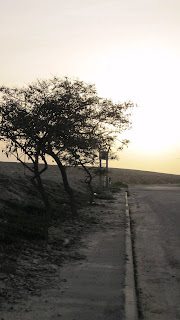The first stop on the trip was a Beduoine town named Hura where we met with the mayor in the town's community center.
The next stop was Kibbutz Cramim in the Negev. I was amazed as we drove up to this kibbutz; all of the desert surrounding it was green where it should have been dry earth. It was really fascinating to see how this community (and others like this one) really built the earth, they cultivated the land and created something to live off of.

Witnessing this really got me thinking about communities in Israel and the overall structure of their agricultural society. In the United States we're all good liberals (lower case L). When people went out West to cultivate the land they did so with the incentive of making a personal fortune. Yes, they did form strong communities but the overall purpose of going West was to make a new life for yourself and your family and make your living off the land. The incentive behind cultivating the land in Israel is very different. When the State was founded in 1948, there were serious trade embargoes with the surrounding countries. One of the most serious embargo was on food. Israel could not get food from other countries so they had to grow it themselves; there was no other option.
That is where the idea of "Bone-e et ha aretz" comes from, you are not just cultivating the land for yourself or a better life for you and your family, you are growing food for the entire nation of Israel. Your work on a Kibbutz is for the good of the State and for the good of the community that you live in.

Although many Kibbutzim are no longer socialist institutions, the strong bonds of community in Israel permeate deep into society. You can see this in many different aspects of Israeli day-to-day life. I've really witnessed this in the Jewish-Israeli society; people really open up and genuinely want to help you out. For example, a few weeks ago, a friend and I ran to the shuk. Halfway there it started hailing and raining. By the time we got to the shuk we were soaking wet and freezing. A random women saw us and offered to give us a ride back to our dorm. She would not take no as an answer. She drove us back to our dorms and let us wear some extra sweaters she had in her car; it was no big deal for her, she just wanted to make sure we were comfortable.
This is something I see all the time in Israel. The next part of the Shabbaton, we went to a desert town called Arad. There were about 90 participants on the program and MASA found all of us a family to have Shabbat dinner with; families were lining up to have people come to their houses. The family I had Shabbat dinner with was amazing. I had such an amazing time. They are a religious family but they were very interested in my Jewish upbringing. The Reform community in Israel is pretty small so according to most religious Jews you are either practicing or not practicing. We spoke a lot about different customs within Judaism and about Reform Judaism in America. They were genuinely interested in the fact that men and women prayed together and that we had women rabbis. Sometimes when I speak to more religious Jews I feel like I am judged for the extent to which I practice Judaism but this family was incredibly supportive and encouraging even though I did not practice in the same way they did. As I was leaving dinner they invited me to come back after Passover. The dad said, "I'm not just saying this because I am Israeli, you should really come back." I thanked them and told them if I was ever in the area again I would take them up on their offer. That's Israel for you!



No comments:
Post a Comment